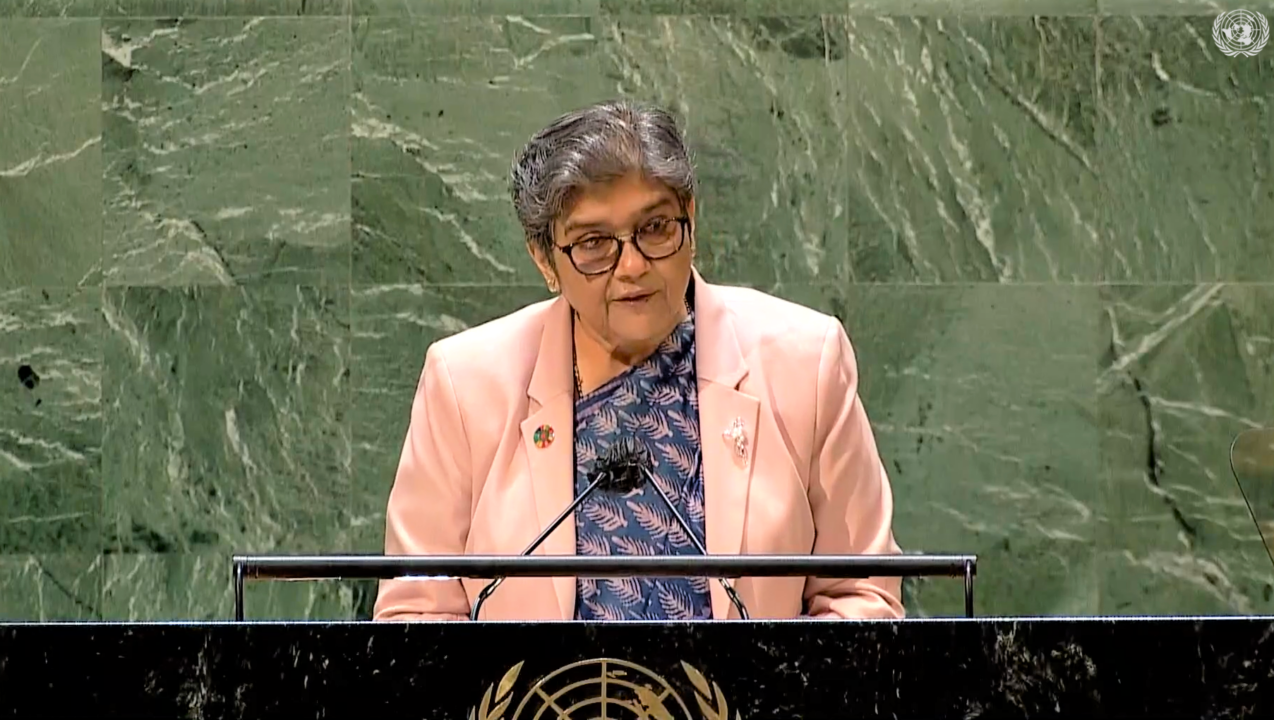I thank you Chair for convening this meeting and sharing the priorities for the year . I join others to congratulate you, once again, on your assumption of the G-77 Chairmanship. Let me also reassure my delegation’s full support to your work.
We have started yet another year amid the unprecedented challenges of the COVID-19 pandemic. To overcome these challenges, the G-77 needs renewed efforts to forge innovative and stronger partnerships among the members. It is not enough to only identify the major issues and priorities for the 2022. We must also draw a roadmap with clear strategies to achieve our objectives.
Let me share a few specific thoughts in this regard:
First, the top priority of the Group in 2022 is to ensure a just and equitable recovery from the COVID-19 pandemic. Of course, the immediate need is to ensure transfer of vaccines technologies to developing countries, allowing TRIPs waiver etc. But we must not lose sight of the overarching imperative to ensure enhanced support for them to achieve the 2030 Agenda.
We call on the Group to leverage its strength of shared vision, solidarity, and partnership to advance this agenda. We must seize the opportunity of any upcoming high-level debates on COVID-19, the thematic debates on “Our Common Agenda”, and SG’s summit of the future to forge a new consensus with the developed countries to ensure a better future for all of us.
Second, we tend to see the Glasgow pact in a positive light. We are encouraged by the Glasgow commitment for enhanced mitigation, for mobilizing climate finance beyond USD 100 billion per year and for doubling adaptation financing etc.
Yet we wish to stress the importance of further enhancing our climate ambitions. The group should continue to stress the importance of higher NDCs commensurate with 1.5-degree target, enhanced financing, technology transfer, and addressing loss and damage. We wish to work with other members of the group to prepare our common position for upcoming negotiations namely, the Climate Conference (COP-27), Biodiversity Conference, Ocean Conference, HLPF Ministerial declaration, the second committee climate resolution etc.
Third, We are seeing an alarming rise of global poverty for the first time since 1997. The inequalities have also risen in all its dimensions. The job losses, salary cuts, loss of businesses, investment, and trade have created the worst recession of our time. Over and above these, millions of students, especially in developing countries, are left out of education due to the lack of access to digital learning platforms.
We see STI as a sine-qua-non to bridge these burgeoning gaps. We wish to work to initiate a new discussion with the developed countries to leverage the power of STI and ensure meaningful transfer of technologies for the benefits of the developing countries. The upcoming STI forum could be the starting point for this discussion. We also underscore the need for enhanced south-south cooperation to take advantage of STI potentials.
Fourth, the global development and economic architecture need to be significantly reformed and strengthened.
The current arrangements of high-level meetings of ECOSOC with WBG and WTO have not been very effective. They often lack focus or don’t have any targeted objectives to strengthen the role of the UN vis-à-vis the WBG and the WTO. It is imperative to work together with a clear vision to ensure a fair and equitable voice of the developing countries in global economic and financial orders; especially in the areas of debt relief, restructuring architecture and SDR allocation.
It is also important to look deeper into the international debt relief and restructuring architecture. We recognize the importance of G-20 DSSI and the IMF new allocation of 650-billion-dollar worth of SDRs. Yet it is also important to note that the lion’s share of this SDR allocation (60%) has gone to the developed countries while the 46 LDCs have received only 2.4% of this allocation. It is, therefore, imperative to engage in more meaningful negotiations to ensure more flexibilities in SDR allocations.
Fifth, The LDCs, LLDCs, SIDs, and African countries are suffering seriously and disproportionately for so long. For these countries, the reinvigorated international support is required more than ever before. We, therefore, feel that all G-77 deliberations and strategic priorities should put the needs of these vulnerable countries at the front and center.
As one of the Co-chairs of the LDC 5 preparatory committee meetings, Bangladesh thanks all the members of the Group for their wholehearted support to the LDCs to reach agreement for an ambitious programme of action for the next decade. The program of Action will be adopted in the LDC5 conference. We look forward to receiving continued support of the Group to make the Conference a success and for implementation of the POA starting from 2022.
Sixth, As IMRF review is coming up in May this year, we wish to work to see migration issue high on the G-77 agenda.
Finally, it is imperative to pay special attention to the follow-up and monitoring of the implementation of resolutions, decisions, and agreements. Also, the discussions held in important meetings during the high-level week, HLPF, VNRs etc. We wish to work with the Group to develop a better accountability framework for implementing the resolutions and decisions as well as the key deliverables of important meetings.
I would rest it here.
I thank you all.

